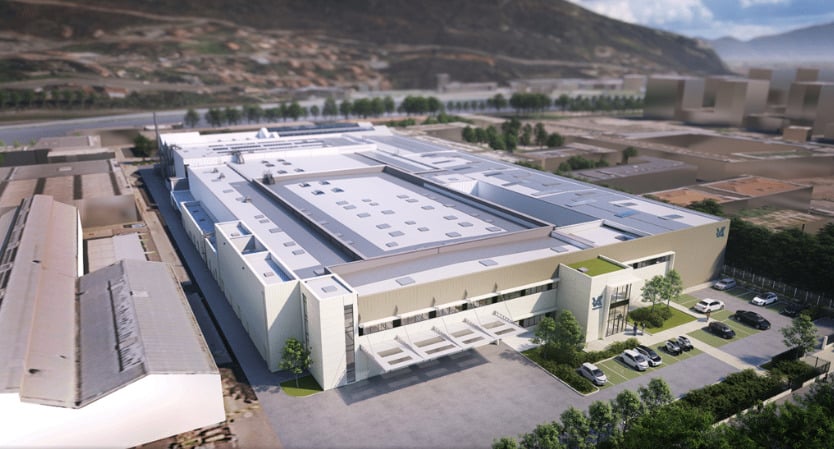
The European Council has formally adopted the EU’s support package for its clean energy manufacturing industry, the Net-Zero Industry Act (NZIA), amidst mixed fortunes for local battery gigafactory projects.
The package of measures, which will come into force in June, will simplify the permit-granting process for strategic projects, facilitate market access for strategic technology products including via public procurement or auctions for renewables and enhance Europe’s clean energy workforce.
Enjoy 12 months of exclusive analysis
- Regular insight and analysis of the industry’s biggest developments
- In-depth interviews with the industry’s leading figures
- Annual digital subscription to the PV Tech Power journal
- Discounts on Solar Media’s portfolio of events, in-person and virtual
For example, EU member states will need to apply non-price criteria for renewables projects for at least 30% of the volume auctioned and will only be allowed to source a maximum 50% of the PV modules in auctions from a single country per year.
The package of measures was agreed on by the European Parliament and Council in February and formally adopted by the Council this week, and is set to enter into force towards the end of June.
The ultimate aim is to have a clean energy manufacturing industry, including solar, wind turbines, batteries and heat pumps that can meet 40% of the EU’s deployment needs, and 15% of global demand by 2040.
The EU is also supporting the lithium-ion battery and battery energy storage system (BESS) sectors through a €4 billion (US$4.3 billion) funding package announced in November 2023, and a €3 billion package specifically for batteries announced a month later.
The passing of the Net-Zero Industry Act comes after a swathe of announcements from lithium-ion battery gigafactory projects across the continent showing mixed fortunes.
France: Verkor raises €1.3 billion green loan
French company Verkor has secured a €1.3 billion green loan from 19 banking entities for the construction of its first gigafactory, in Dunkirk, which will have an annual lithium-ion battery production capacity of 16GWh.
The firm’s shareholders include automotive group Renault and its offtake will primarily go to the electric vehicle (EV) sector, but it struck a partnership with system integrator Nidec ASI to co-develop BESS technology in September 2023.
In an interview earlier this year (Premium access), Thomas Herman, of counsel at law firm Herbert Smith Freehills (HSF), said securing financing for gigafactory projects was one of their biggest challenges (HSF advised Renault on its investment in Verkor).
Germany: Svolt withdraws gigafactory plan
It isn’t just local companies building gigafactories in Europe. Numerous China-based companies have set up on the continent including CATL, with the US market more difficult to enter.
One of those was set to be Svolt, a Jiangsu-headquartered lithium-ion manufacturer, but the firm this week said it was cancelling a gigafactory project in Brandenburg, Germany. It has another project, in Überherrn, but that is facing legal action to stop it going ahead.
The reasons given for cancelling the Brandenburg project were a highly volatile automotive market, the lack of planning and legal certainty for the construction of production facilities and the cancellation of an ‘extensive customer project’.
Kai-Uwe Wollenhaupt, president Svolt Europe, said: “The automotive market is currently struggling with considerable fluctuations and challenges all over the world, mainly driven by the transformation to electric mobility.”
“This is leading to some drastic strategy adjustments for some car manufacturers. At Svolt, in addition to already low planning certainty at various levels — from the threat of international punitive tariffs to market distortions due to lengthy and unevenly distributed subsidies — a significant customer project has now also been lost. On top of this, the renewed discussions about the end of combustion engines in the EU are having a counterproductive effect on the planned localisation efforts.”
Norway: Freyr assessing options for gigafactory site
Energy storage-focused lithium-ion gigafactory firm Freyr is weighing up its options for its gigafactory site in Norway (which isn’t in the EU but can access its internal markets as part of the European Economic Area), including turning it into a battery component manufacturing site rather than cells.
The firm announced in late 2023 that it was scaling back its investment plans in Europe including pausing the full ramp-up of its Norway gigafactory site Giga Arctic, with CEO Birger Steen telling Energy-Storage.news that the US’ Inflation Reduction Act (IRA) had made manufacturing lithium-ion batteries in Europe far less cost-competitive.
Freyr has been holding out for a financial support package from the government of Norway, but in early May said it was evaluating use cases for Giga Arctic, after receiving an unsolicited inquiry regarding a potential sale of the 75,000 sqm site for possible use cases including as a data centre.
Note that the potential gigafactory site of UK firm Britishvolt was recently sold to private equity firm Blackstone for exactly that, in April.
Freyr said that the use case for the Giga Arctic site could include its original design as a gigafactory using the semi-solid lithium-ion manufacturing process licensed from 24M, or battery component manufacturing or other related battery industrial applications.
In Europe, it has an energy storage system (ESS) partnership with system integrator Nidec ASI and could pursue similar partnerships in the US with other companies looking to leverage its locally produced battery cells there. It has a gigafactory site in Georgia, on which it is continuing development.
Slovakia: InoBat produces first battery cells
Gigafactory company InoBat announced in late April that it had produced its first battery cells, making it the fifth European country to be capable of doing so with ‘European know-how’ (after Sweden, Norway, Germany and France).
The firm is pursuing a larger gigafactory project in partnership with another China-based company, Gotion.






